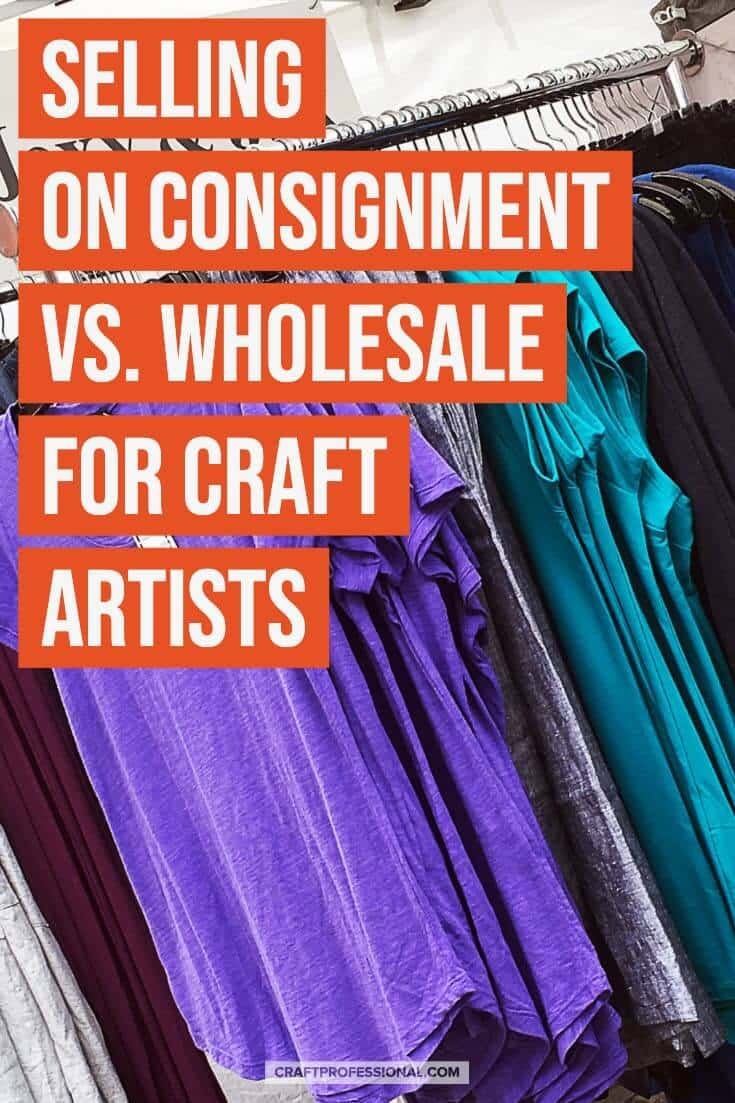Selling on Consignment vs. Wholesale
Let's compare selling on consignment vs. wholesale. Some experts say you should avoid craft consignment because wholesale is the superior choice. You can determine if that's true for your business, or if, perhaps, negotiating a consignment agreement with a retailer is a good fit for your business goals.
Some people will tell you craft consignment is always a bad idea. They insist that wholesale is invariably a superior choice for all craft artists all the time.
I disagree.
While selling to wholesale customers will be a smart way for some craft artists to reach their business goals, it's not best choice for everyone.
Selling on Consignment vs. Wholesale to Meet Your Business Goals
There are a multitude of reasons for starting a craft business, and a multitude of goals craft artists want to achieve. Depending on your own business goals, consignment might be a great option to reach those goals, or it might not be the right fit for your business.
Instead of accepting sweeping generalizations about different craft business models, it's smart to look at your own individual goals. Evaluate opportunities with your unique business goals in mind.
Your craft business is your own, and, ideally, it should reflect and work with your personal values and goals. Building a business around wholesaling may or may not reflect those goals. Selling your crafts on consignment, for some, might be a better fit.
Don't accept the conclusions of others without first giving some serious thought. Their creative business goals, and their definition of business success may not be in line with your own.
Consignment Selling Was Right for My Business
Although I eventually moved my business entirely online, there was a time when I sold handmade jewelry on consignment at a local gift shop. It was a great fit for my new business.
Developing a wholesale customer base was not what I wanted when I was selling handmade jewelry.
My vision for my business at that time involved selling at craft shows and online because that approach to running my business was a good fit with my values, goals and other commitments.
The thought of having to spend massive production hours in the studio to fulfill a big wholesale order on time was completely out of line with my business goals. I know receiving orders like that would be an absolute dream for some craft artists, and if it is a dream for you, go for it! It just wasn't my dream.
Wholesaling didn't fit into the picture for me.
However, with some business networking, an opportunity to establish a consignment arrangement with a local shop owner popped up for me, and that partnership was a great fit for my business goals and personal priorities.
What if you do aspire to sell your crafts wholesale?
If you would like to build your craft business around wholesale sales to retail shops, don't immediately disregard consignment selling. It may not be what you want for your business in the long term, but it may help you achieve your bigger goals.
New craft show vendors sometimes start out selling at a few smaller shows to establish a track record and learn the ropes before making the bigger commitment of selling at larger shows. Some better shows, in fact, will ask in their application process what other shows you've done, and being able to list a few can help your chances of being accepted to those more competitive shows.
Similarly, selling your crafts on consignment can help you establish a track record when you have none. It can be a stepping stone to wholesaling your crafts.
If your business is brand new, you won't have any performance record that proves your products sell well in retail shops. Without a track record, it can be tough to get your first wholesale orders.
Retailers are taking a risk when they invest a lot of money buying a large volume of your product. If you can show them a positive performance record of sales, you can help retailers feel more confident taking that risk.
Consignment sales can help you establish that kind of record, particularly when your business is new and unproven.
Consignment to Wholesale
There are some retailers who will offer the option to shift from a consignment agreement to a wholesale relationship within a set period of time if your items are selling well. 90 days is a fairly common time frame to test your products.
Some retailers will not enter into a wholesale arrangement without testing your products in their stores on a consignment basis first.
Those retailers are motivated to switch to a wholesale arrangement because they will receive a larger percentage of the retail sale price, and they will spend less time managing a wholesale account vs. a consignment account.
Retailers do take on a larger risk buying your products outright in a wholesale arrangement. However, if they have tried working with you on a consignment basis and in that time:
- your products have proven popular with their customers
- and you've been a professional person to work with
their risk is minimized.
If you're entering into a consignment selling arrangement with a retailer, and you have a goal to move to wholesale, be sure to communicate that clearly from the start. Ask about the possibility and clarify the terms that would need to be met to establish a wholesale arrangement.
Alternatively, your first consignment-based retailers might not wish move to a wholesale arrangement. However, your business' presence in those shops, and sales figures can still be used to help you build wholesale arrangements with other retailers.



New! Comments
Have your say about what you just read! Leave me a comment in the box below.